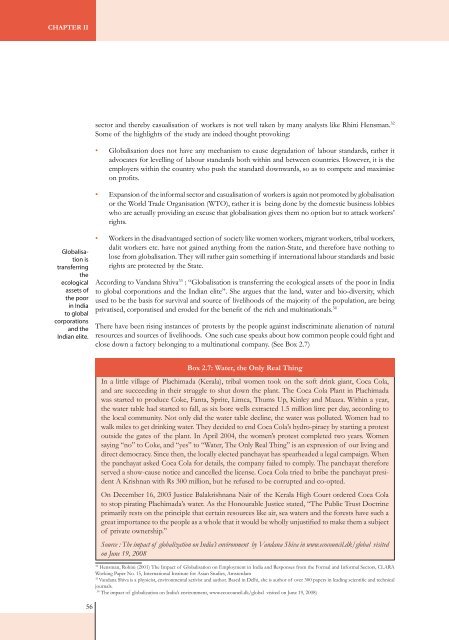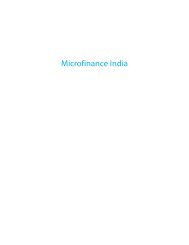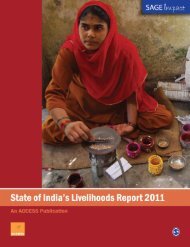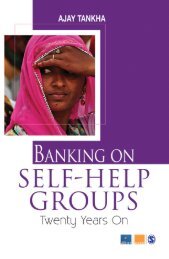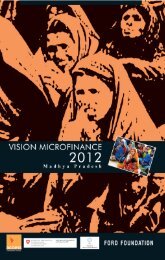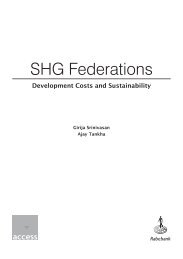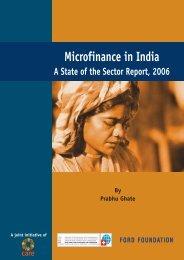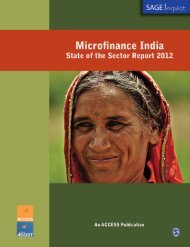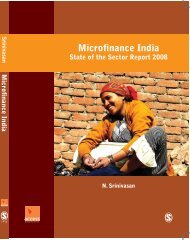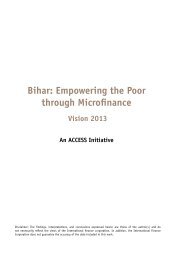SOIL Report 2008 - ACCESS Development Services
SOIL Report 2008 - ACCESS Development Services
SOIL Report 2008 - ACCESS Development Services
You also want an ePaper? Increase the reach of your titles
YUMPU automatically turns print PDFs into web optimized ePapers that Google loves.
Chapter IIsector and thereby casualisation of workers is not well taken by many analysts like Rhini Hensman. 32Some of the highlights of the study are indeed thought provoking:• Globalisation does not have any mechanism to cause degradation of labour standards, rather itadvocates for levelling of labour standards both within and between countries. However, it is theemployers within the country who push the standard downwards, so as to compete and maximiseon profits.• Expansion of the informal sector and casualisation of workers is again not promoted by globalisationor the World Trade Organisation (WTO), rather it is being done by the domestic business lobbieswho are actually providing an excuse that globalisation gives them no option but to attack workers’rights.Globalisationistransferringtheecologicalassets ofthe poorin Indiato globalcorporationsand theIndian elite.• Workers in the disadvantaged section of society like women workers, migrant workers, tribal workers,dalit workers etc. have not gained anything from the nation-State, and therefore have nothing tolose from globalisation. They will rather gain something if international labour standards and basicrights are protected by the State.According to Vandana Shiva 33 : “Globalisation is transferring the ecological assets of the poor in Indiato global corporations and the Indian elite”. She argues that the land, water and bio-diversity, whichused to be the basis for survival and source of livelihoods of the majority of the population, are beingprivatised, corporatised and eroded for the benefit of the rich and multinationals. 34There have been rising instances of protests by the people against indiscriminate alienation of naturalresources and sources of livelihoods. One such case speaks about how common people could fight andclose down a factory belonging to a multinational company. (See Box 2.7)56Box 2.7: Water, the Only Real ThingIn a little village of Plachimada (Kerala), tribal women took on the soft drink giant, Coca Cola,and are succeeding in their struggle to shut down the plant. The Coca Cola Plant in Plachimadawas started to produce Coke, Fanta, Sprite, Limca, Thums Up, Kinley and Maaza. Within a year,the water table had started to fall, as six bore wells extracted 1.5 million litre per day, according tothe local community. Not only did the water table decline, the water was polluted. Women had towalk miles to get drinking water. They decided to end Coca Cola’s hydro-piracy by starting a protestoutside the gates of the plant. In April 2004, the women’s protest completed two years. Womensaying “no” to Coke, and “yes” to “Water, The Only Real Thing” is an expression of our living anddirect democracy. Since then, the locally elected panchayat has spearheaded a legal campaign. Whenthe panchayat asked Coca Cola for details, the company failed to comply. The panchayat thereforeserved a show-cause notice and cancelled the license. Coca Cola tried to bribe the panchayat presidentA Krishnan with Rs 300 million, but he refused to be corrupted and co-opted.On December 16, 2003 Justice Balakrishnana Nair of the Kerala High Court ordered Coca Colato stop pirating Plachimada’s water. As the Honourable Justice stated, “The Public Trust Doctrineprimarily rests on the principle that certain resources like air, sea waters and the forests have such agreat importance to the people as a whole that it would be wholly unjustified to make them a subjectof private ownership.”Source : The impact of globalization on India’s environment by Vandana Shiva in www.ecocouncil.dk/global visitedon June 19, <strong>2008</strong>5632Hensman, Rohini (2001) The Impact of Globalisation on Employment in India and Responses from the Formal and Informal Sectors, CLARAWorking Paper No. 15, International Institute for Asian Studies, Amsterdam33Vandana Shiva is a physicist, environmental activist and author. Based in Delhi, she is author of over 300 papers in leading scientific and technicaljournals.34The impact of globalization on India’s environment, www.ecocouncil.dk/global visited on June 19, <strong>2008</strong>)


